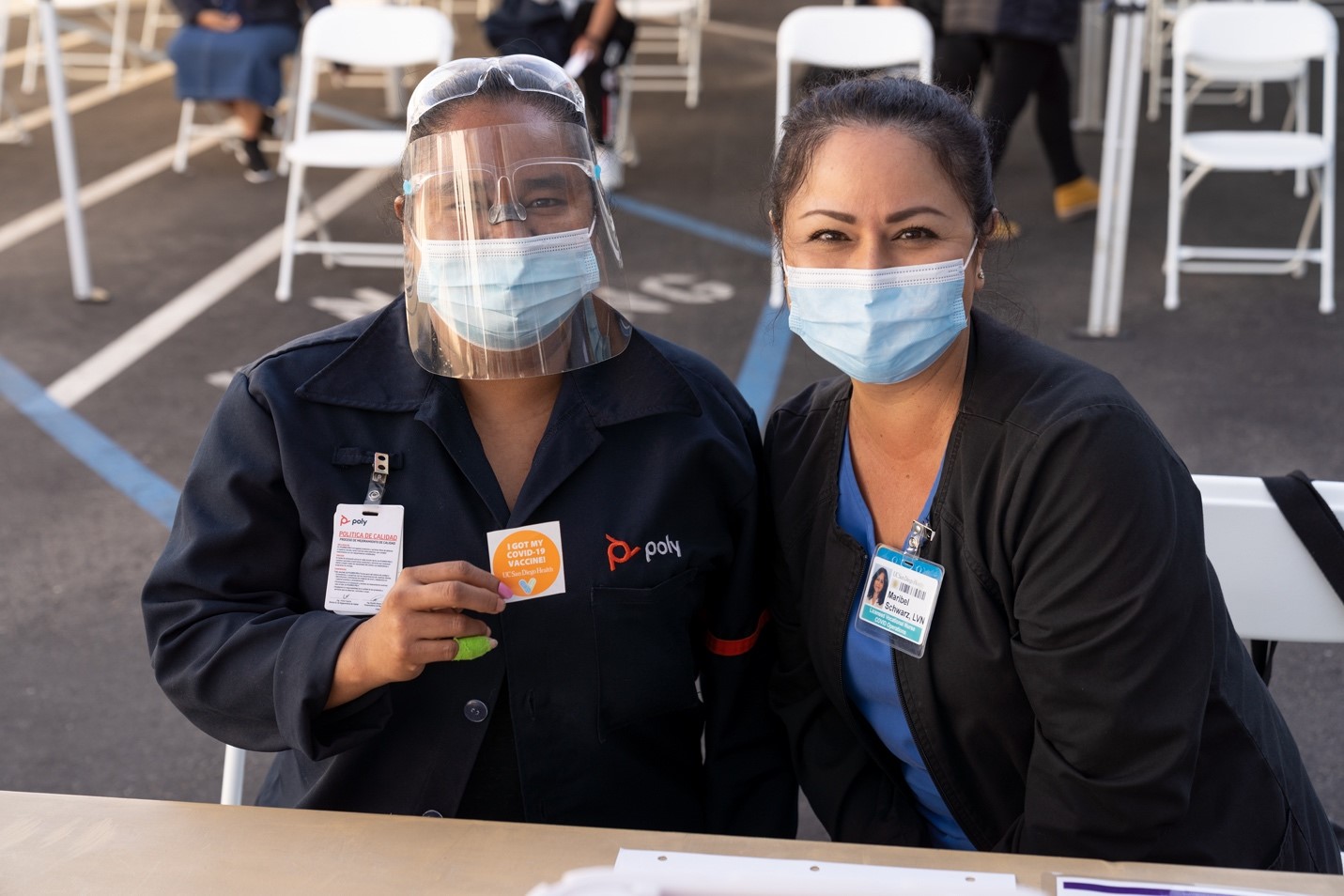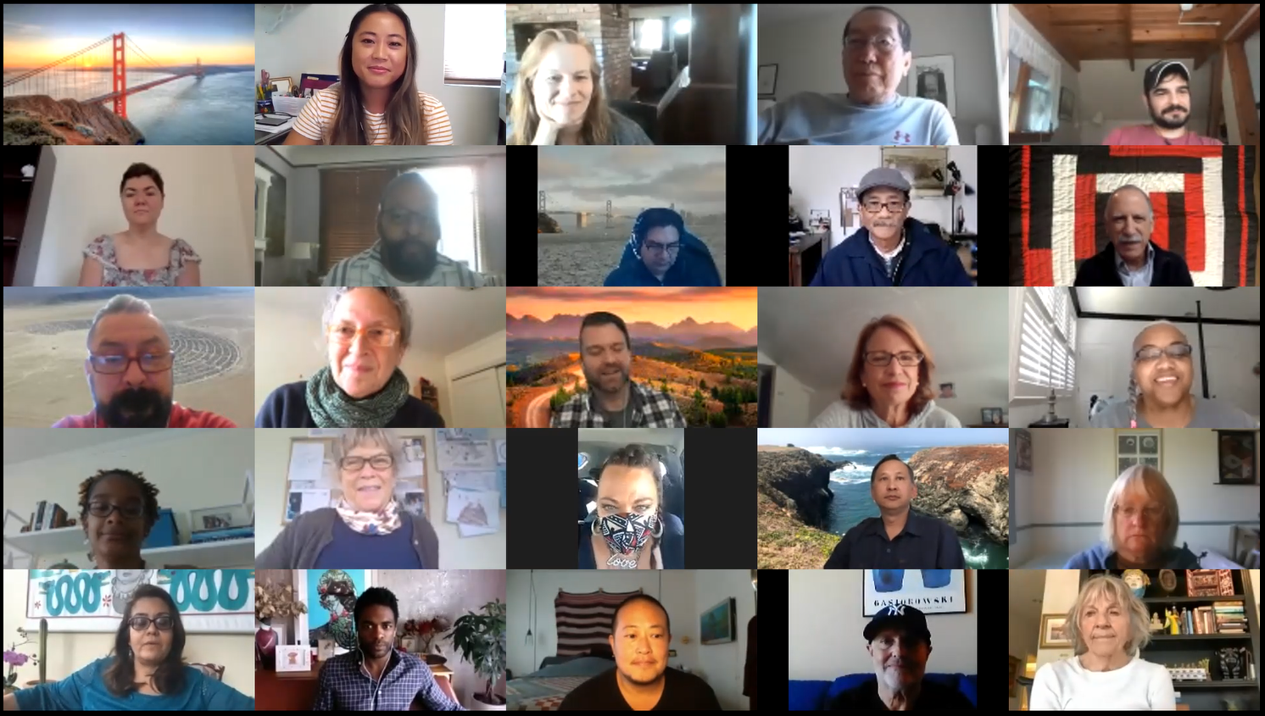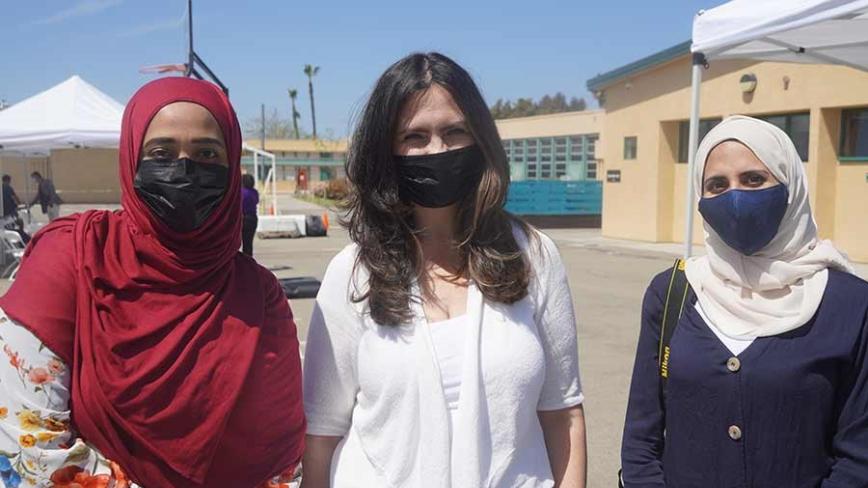As the novel coronavirus began to spread, teams across University of California knew that the need to translate scientific discovery into therapies and vaccines to fight COVID-19 would be urgent. At the same time, the growing pandemic highlighted widespread inequalities in health and the urgency of achieving greater health equity.
UC’s five Clinical and Translational Science Award (CTSA) teams were already positioned to address needs at the intersection of COVID-19 and health equity, but the process of securing funding for research and community outreach programs often can be slow. UC Biomedical Research Acceleration, Innovation and Development (UC BRAID) took action to support immediate projects by creating a grant program to enable UC CTSAs to quickly respond to the need for COVID-19 related clinical trials and vaccination efforts that are inclusive and benefit vulnerable communities.

"Improving the health of children across our state has never been more important than in the past year of the pandemic. Our children's hospitals and care teams work tirelessly for the most seriously ill children and those in need of routine and preventative care."
The inequality in health across our state and nation is now even more apparent as we see the disproportionate impact of COVID-19 in communities of color and lower socioeconomic areas. The problems leading to health disparities will take years to address. In the short term, we must start working toward better diversity in the clinical trials that translate the wealth of scientific research in our state and nation into benefits for all. The UC BRAID grants have helped create momentum for addressing these issues.
In September 2020, UC BRAID’s Addressing Health Equity in COVID Research initiative launched to provide $100,000 in support to each of the five UC CTSAs to enhance existing research projects and enable increased inclusion. The initiative was a mechanism to quickly provide support to existing projects, such as clinical trials, social/behavioral and community engagement research, and address the intersecting challenges of COVID-19 and health disparity. The funding has supported efforts to expand reach and inclusion in COVID-19 related clinical trials, increase vaccination rates and improve data collection.

The urgent actions to fight COVID-19 also have to address the critical need to involve more people from our most vulnerable communities in the drug and vaccine development process. Through their engagement and participation, we gain valuable insights on safety and efficacy as well as build trust. The UC BRAID grants have helped keep pandemic-related work moving forward with immediate actions that also make progress toward health equity.
Grants in action
UC Davis
The Clinical and Translational Science Center (CTSC) has long standing programs to address underlying factors that lead to health disparities, such as low representation of certain communities in clinical research. The CTSC invested the UC BRAID initiative funds in its program to broaden participation of groups traditionally underrepresented in clinical research, especially the Latinx, Black and Native American communities of the California Central Valley and North Valley as well as low income, urban populations. All of these communities have been disproportionately affected by COVID-19.
- Funding community engagement activities to increase COVID-19 testing numbers by providing compensation to survey participants and hiring an expert to test cognitive interviews and by improving core data collection instruments for the ORALE COVID-19 project funded by National Institutes of Health’s (NIH) Rapid Acceleration of Diagnostics for Underserved Populations (RADx-UP).
- Supporting Asian, immigrant, and refugee communities in South Sacramento by providing culturally appropriate nutrition support to more than 150 families weekly. The work sustained both families and locally owned small businesses at the height of the pandemic.
- Establishing a relationship between youth nutrition and food preparation training programs and small farm suppliers to deliver produce to a local low-income, historically Black community classed as a food desert and underserved by public transit. The CTSC coordinated virtual instruction in healthy meal preparation, incorporating fresh, seasonal fruits and vegetables.
UC Irvine
Institute for Clinical and Translational Science (ICTS) used the UC BRAID funding to improve inclusion in its COVID-19-related clinical trials. The team focused on expanding its reach and improving representation of diverse and often underserved groups in Orange County and neighboring areas. Building on its existing consortium of community hospitals, ICTS worked to ensure robust recruitment in the large Latino community in central Orange County that was experiencing a surge in COVID-19. It also targeted the Vietnamese-American community, which is the largest concentration outside of Vietnam itself. Additionally ICTS enhanced its partnership with African-American communities through an existing collaboration with the VA Long Beach Healthcare System and the MemorialCare health system. A highlight of the work was a series of focus groups centered on:
- Hispanic, low-income parents and children to learn about attitudes regarding pediatric vaccines.
- Vulnerable populations such as elderly and Latinx individuals on vaccine responsiveness.
- Veterans through ICTS outreach to the UCI-affiliated Tibor Rubin VA Medical Center in Long Beach.
Additionally, the funds were used to translate the Consent-to-Contact (C2C) Research Registry into Spanish, Korean, Chinese, and Vietnamese. The C2C aims to raise awareness of research participation opportunities at UCI by connecting those interested in participating in research with research studies. Having the registry in other languages will help researchers at UCI recruit participants who better represent the diversity of our country and our nation.
UCLA
The UCLA Clinical and Translational Science Institute (CTSI) used the additional resources to support clinical trial enrollment as well as research on attitudes toward a COVID-19 vaccine and factors that influence disease spread. The work supported CTSI’s mission to translate discoveries to improve health in Los Angeles, especially among the underserved. Projects supported by the UC BRAID grant included:
- STOP COVID-19 CA (Share, Trust, Organize, Partner: The COVID-19 California Alliance), which CTSI coordinates and participates in, alongside 11 academic institutions and 70 community-based organizations. The group works to reduce structural barriers to vaccine registration and facilitate vaccination through on-the-ground community outreach in low-socioeconomic communities with low vaccination rates. Activities also include monitoring trends in vaccine hesitancy via research surveys. The coalition is part of the broader Community Engagement Alliance Against COVID-19 Disparities (CEAL) initiative from NIH and is led in California by CTSI.
- A project led by CTSI partner site Charles Drew University to help community health workers decrease barriers to COVID-19 testing for safety-net patients in Los Angeles County. The project is funded primarily through the Rapid Acceleration of Diagnostics for Underserved Populations (RADx-UP) for Social, Ethical, and Behavioral Implications (SEBI) initiative supported by NIH.
- California Get Out the Vaccine (GOTV) campaign, for which CTSI partnered with the Governor’s Office of Government Operations to contract 34 community organizations in the Central Valley and Los Angeles County for door-to-door canvassing for COVID-19 vaccination and social services linkages, such as rental assistance, food assistance programs and other COVID-19 recovery programs.
UC San Diego

Credit: UC San Diego Health
The Altman Clinical and Translational Research Institute (ACTRI) is committed to improving access to medical care in San Diego County as well as Imperial County, an underserved area in Southern California.
Through the UC BRAID grant, ACTRI supported the following projects:
- The Refugee Health Unit served as an information source for refugee communities, surveying their experience and needs during the pandemic and providing information and resources in 12 languages to address vaccine hesitancy. They also coordinated with UC San Diego Health’s mobile vaccine unit to deliver vaccines directly to these communities. The mobile unit also vaccinated thousands of cross-border workers in partnership with the Consulate General of Mexico.
- In collaboration with El Centro Regional Medical Center, the building of clinical trial infrastructure and capacity to enable future vaccine and novel COVID-19 therapies and non-COVID research in the region. Work included creation of a research footprint, including space to recruit participants and administer investigational drugs. ACTRI also provided a clinical research coordinator, regulatory expertise and knowledge sharing to successfully launch and perform clinical trials.
- The establishment of the San Diego Advancing Minority Health Literacy Program to address the disproportionate effects of the pandemic on racial and ethnic minorities by enhancing testing, contact tracing and other mitigation measures. A committee of health literacy experts and eight local government partners, including the City of Chula Vista, will identify and implement culturally sensitive strategies in local communities.
UCSF

Credit: UCSF
Clinical and Translational Science Institute (CTSI) used the UC BRAID funding to support elements of two key programs designed to combat systemic barriers to racial inclusivity in COVID-19 research. These programs will serve as models for more general anti-systemic racism efforts in research going forward.
- An institutional Task Force on Equity and Anti-Racism in Research to better inform the institution on structural issues that impact COVID-19 research equity. This Task Force generated recommendations for systematic change, supported and funded an anti-racism pilot research grant mechanism and leveraged this work to attract other campus partners. The initiative also helped further community-based research projects focused on vulnerable populations and the underserved.
- A community engagement program to enhance participation of community members of color and other key stakeholder groups on the UCSF COVID Patient and Community Advisory Board (PCAB). The board provided consultation to more than 20 COVID-19 clinical research projects at UCSF as well to the clinical research enterprise to ensure that health equity and patient/community engagement is a priority. By engaging unrepresented community members, the board had more representative input for diversity, equity and inclusion review of COVID-19 studies. Also, the input from a more diverse board helped researchers understand how to better reach communities most impacted by COVID-19 and engage populations traditionally underrepresented in clinical research. This program also led to participation in the cross-UC STOP COVID-19 CA effort.
About University of California Health
University of California Health (UCH) comprises six academic health centers, 20 health professional schools, a Global Health Institute and systemwide services that improve the health of patients and the University’s students, faculty and employees. All of UC’s hospitals are ranked among the best in California and its medical schools and health professional schools are nationally ranked in their respective areas.
Clinical trials at University of California
Clinical trials are one of the most important ways that potential new treatments are developed. They are a cornerstone of the University of California’s unparalleled clinical research enterprise. And they elevate care for current and future patients across the University of California Health (UCH) system’s six academic health centers.

